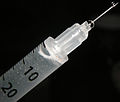
Back Dopatge als Jocs Olímpics Catalan Dopaje en los Juegos Olímpicos Spanish Dopage aux Jeux olympiques French Dopingas olimpinėse žaidynėse Lithuanian Допинг на Олимпијским играма Serbian
This article's lead section may be too short to adequately summarize the key points. (February 2025) |
| Part of a series on |
| Doping in sport |
|---|
  |
Doping at the Olympic Games refers to the use of prohibited performance-enhancing substances and methods by athletes competing in the Games. Throughout the history of the modern Olympics, doping has been a persistent and controversial issue, raising concerns about fair play, athlete health, and the integrity of sport. The pursuit of competitive advantage has led athletes to use a variety of banned substances, including anabolic steroids, stimulants, and erythropoietin (EPO), as well as methods like blood doping. Efforts to combat doping have evolved significantly, with the establishment of anti-doping organizations, the development of sophisticated testing methods, and the implementation of stricter penalties. High-profile doping scandals have tarnished the reputation of the Olympics and highlighted the ongoing challenge of maintaining a level playing field. The fight against doping remains a central focus of the Olympic movement, with continuous efforts to improve detection, prevention, and education.
© MMXXIII Rich X Search. We shall prevail. All rights reserved. Rich X Search